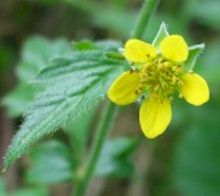 |
This, the Herba Benedicta, or Blessed Herb, or Avens (Geum Urbanum) is a very common plant of the Rose tribe, in our woods, hedges, and shady places. It has an erect hairy stem, red at the base, with terminal bright yellow drooping flowers. The ordinary name Avens or Avance, Anancia, Enancia signifies an antidote, because it was formerly thought to ward off the Devil, and evil spirits, and venomous beasts. Where
the root is in a house Satan can do nothing, and flies from it: "therefore" (says Ortus Sanitatis) "it is blessed before all other herbs; and if a man carries the root about him no venomous beast can harm him." The herb is sometimes called Way Bennet, and Wild Rye. |
Its graceful trefoiled loaf, and the fine golden petals of its flowers, symbolizing the five wounds of Christ, were sculptured by the monks of the thirteenth century on their Church architecture. The botanical title of this plant, Geum, is got from Geuo, "to yield an agreeable fragrance," in allusion to the roots. Hence also has been derived another appellation of the Avens Radix Caryophyllata, or "clove root," because
when freshly dug out of the ground the roots smell like cloves. They yield tannin freely, with mucilage, resin, and muriate of lime, together with a heavy volatile oil. The roots are astringent and antiseptic, having been given in infusion for ague, and as an excellent cordial sudorific in chills, or for fresh catarrh. To make this a pint of boiling water should be poured on half an ounce of the dried root, or rather more of the fresh root,
sliced. Half a wineglassful will be the dose, or ten grains of the powdered root. An extract is further made. When the petals of the flower fall off, a small round prickly ball is to be seen.
Herb Simples
The Primitive Simplers presented here show the way of life in other generations, it is not suggested or recommended trying them yourself. |


